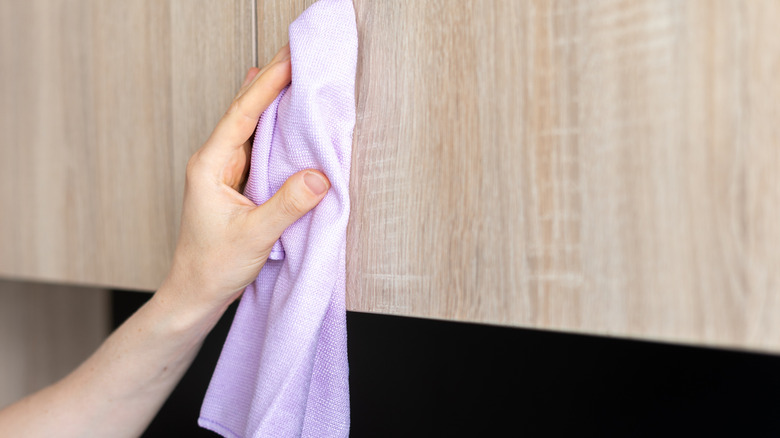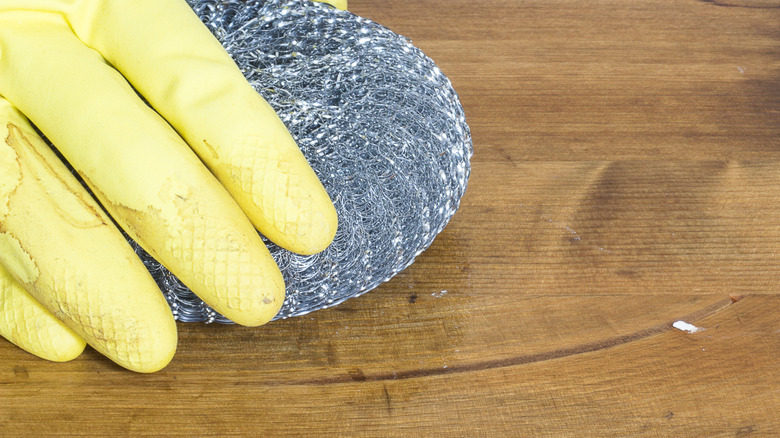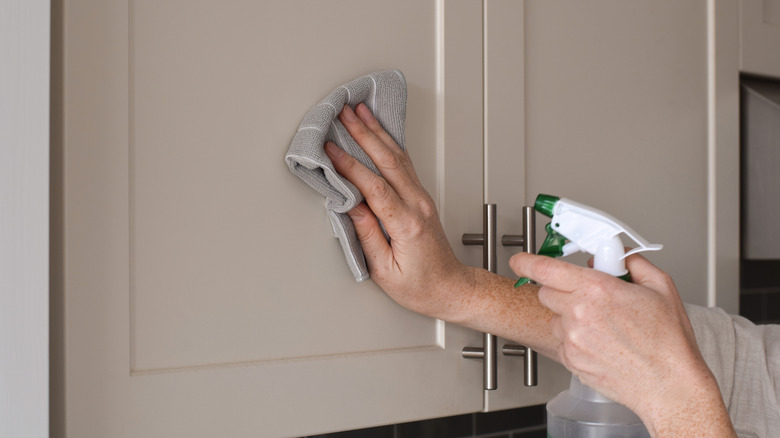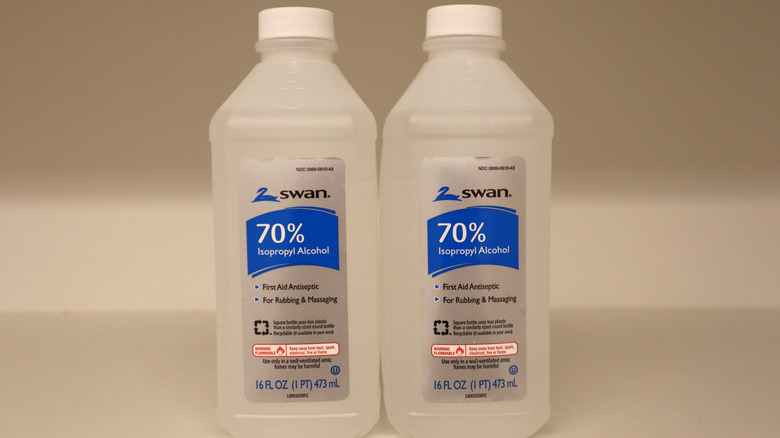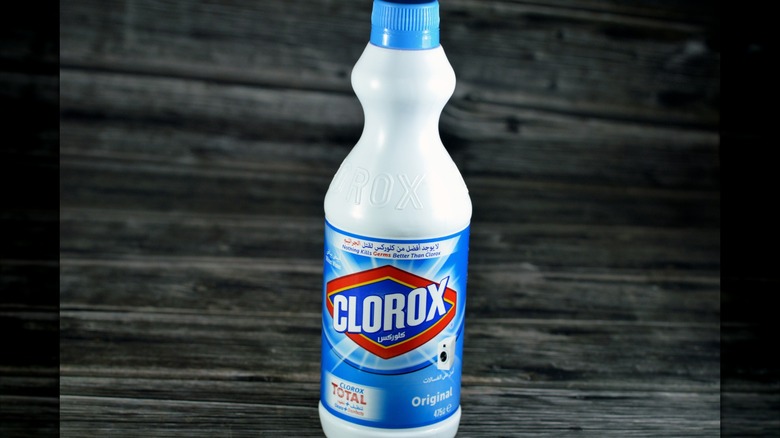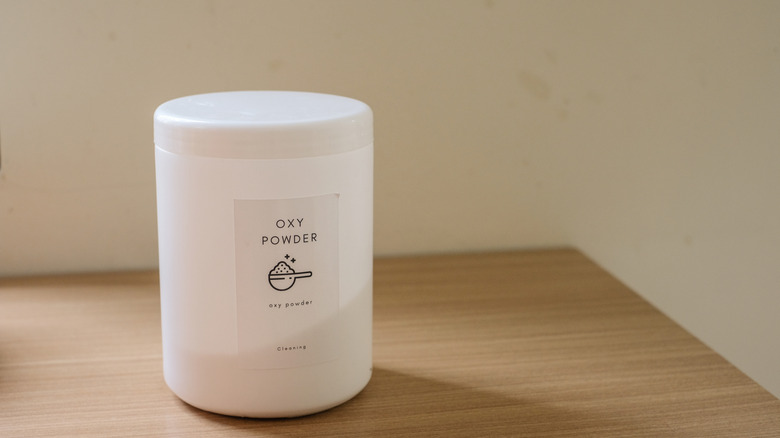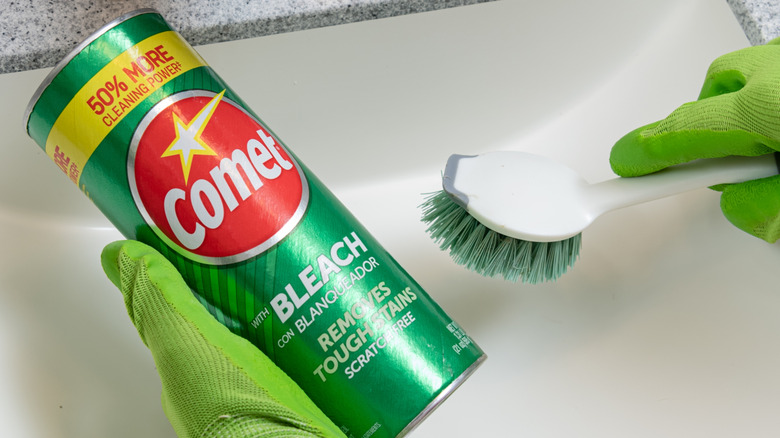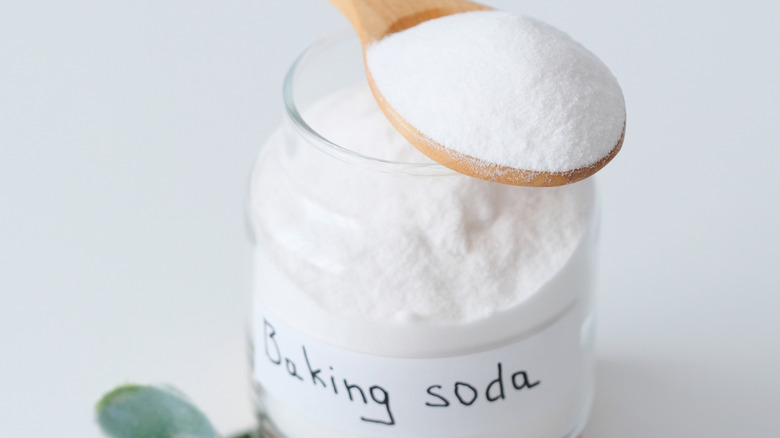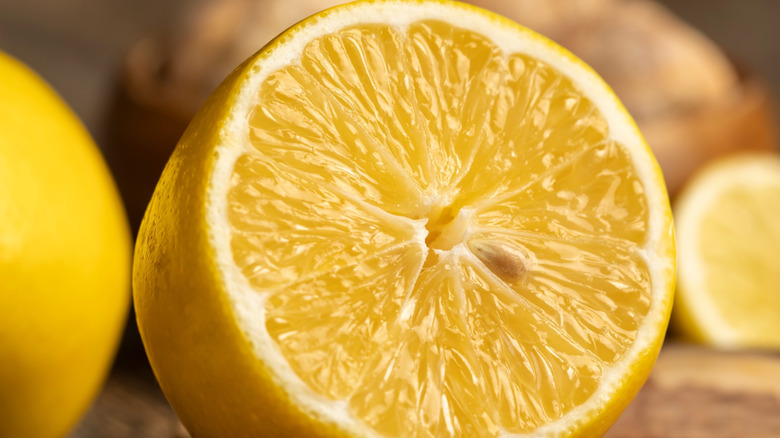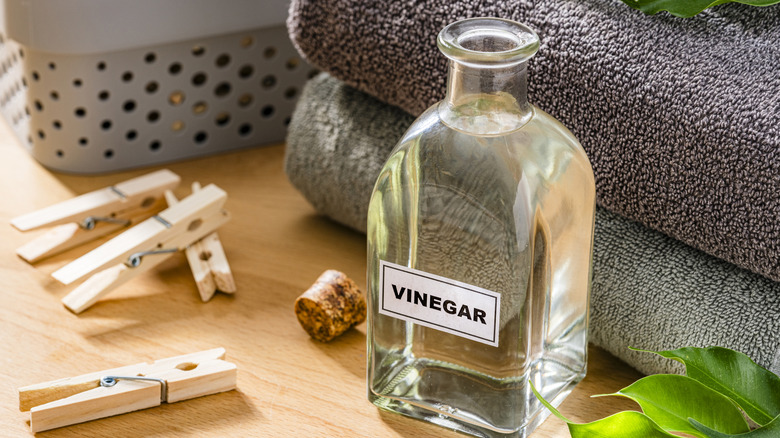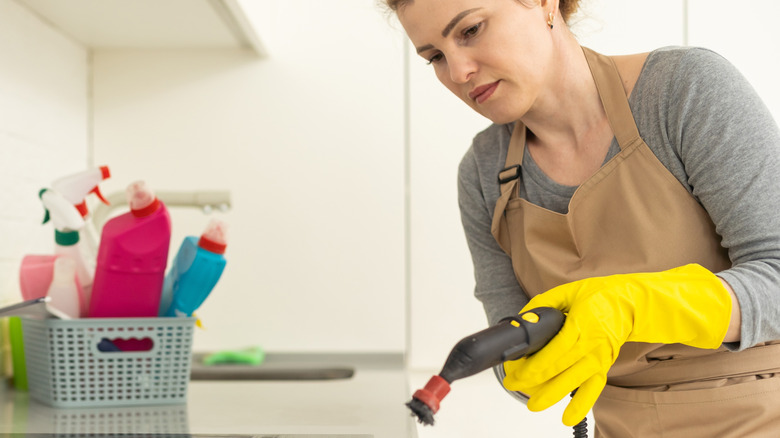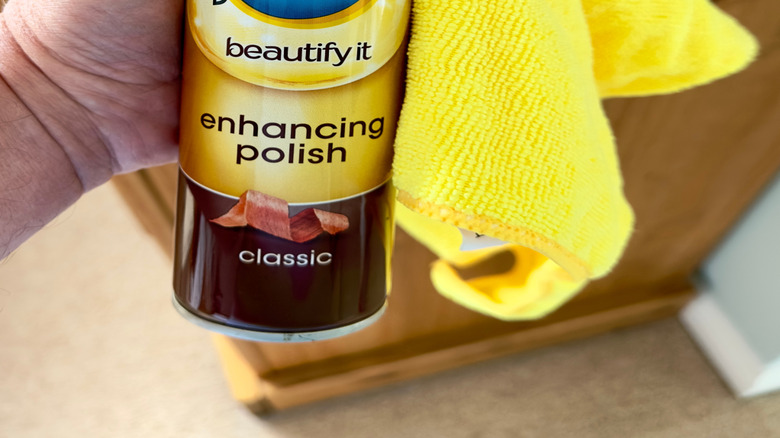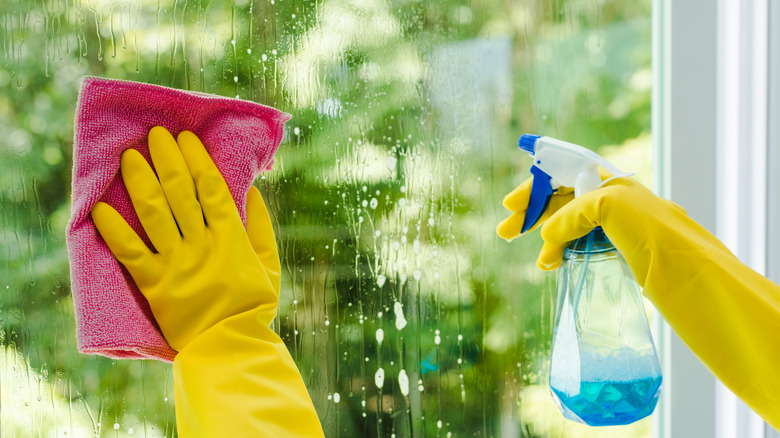12 Common Cleaning Products You Should Never Use On Your Wood Cabinets
There are many areas of your home that are exposed to daily messes: sinks, countertops, toilets, oven, and range all come to mind. While wooden cabinets themselves might not be as immediately obvious as surfaces that need to be cleaned regularly, it doesn't take long to realize that they are just as grungy as the aforementioned areas and need some TLC. Exposed to a constant barrage of steam, oil, splatters of sauce, and splashes from spilled liquids, wooden cabinets can be surprisingly grimy (though you might not notice it unless you get up close). Your wooden cabinets are messy — no big deal, right? Though you might be thinking you can use any cleaner to refresh them, this would be folly since many common cleaning products can pose a danger to your cabinets.
If you were blissfully unaware of the harm that your cleaning habits have been causing your wooden cabinets, it's important to not beat yourself up too much. Instead, you can spend some time educating yourself as to what products should be avoided at all costs to prevent damage. Wood is one of the best options for your cabinets, and its natural qualities mean that the list of prohibited cleaning products is extensive. Ranging from abrasive scouring pads and hot steam cleaners to bleach and ammonia, there are many items that can damage the material. Fortunately, with the right knowledge, you'll be on your way to healthier wooden cabinets that can last for years and years.
Mesh scouring pads
While scouring pads are excellent at cleaning some stubborn stains and certain surfaces, they should never be used on your wooden cabinets. The abrasive nature of these resilient scrubbing tools can leave deep scratches in your cabinets. In addition, they can make the surface of the cabinets more prone to damage from liquid or other substances that will come in contact with the wood. Struggling to get a stubborn layer of grease off? Here are 15 genius tips for cleaning your kitchen cabinets.
Ammonia
If you're tempted to use some ammonia to clean your grimy wooden cabinets, think again. This pungent cleaning product is very harsh — too harsh for your wooden cabinets — and can cause significant damage. The impact it can have on your cabinets can range from altering the color of the wood to damaging its appearance and condition. It's best to steer clear of this substance and opt for something gentler.
Rubbing alcohol
Rubbing alcohol is an effective and affordable cleaner for a number of needs around your house — your wooden cabinets, however, are not one of them. Since it is so harsh, rubbing alcohol (like ammonia) can strip the wood's finish. This will leave your cabinets looking lackluster, as well as making them susceptible to further damages. It can also be so drying to your wood that it can result in splintering.
Bleach
Everyone loves bleach for cleaning the grossest of gross messes: from mildew and mold to stained linens, no cleaner packs quite as powerful a punch as this whitening disinfectant. True as all these characteristics of bleach may be, it is not a suitable cleaner when it comes to cleaning your wooden cabinetry. Truth be told, bleach is simply too harsh of a cleaner to be used on your wooden cabinets, and it can easily strip away the finish, leading to poorly protected wood that can become damaged in the future.
Oxi-Clean
Oxi-Clean is a versatile cleaning ingredient that can lead to brighter-looking laundry, and it's even suitable for scrubbing your outdoor deck patio that has become green with algae over the summer. Unfortunately, the powerful ingredients and abrasive nature of the powder are too harsh for your home's wooden cabinets. While Oxi-Clean can be used on unfinished wood safely in many cases, cabinets are prone to damage from this product, so you should avoid exposing them to it.
Comet powder cleaner
Looking to get that ring of grime out of your bathtub? There's perhaps no better product to tackle it than Comet. That being said, Comet is a no-no when it comes to wooden cabinet cleaning. Containing bleach as an active ingredient and being abrasive in nature means that it will not take long before it hurts your cabinets' health and appearance. Skip over this powerful cleaner when it comes time to clean your cabinets and save it for bathtub and toilet scrubbing instead.
Baking soda
Known for its ability to clean or deodorize practically anything, baking soda is not an ideal cleaner for your wooden cabinets. Despite its popularity, it falls into the category of abrasive cleaners, which can wear down the protective finish of your wooden cabinets over time. Baking soda also has the issue of being difficult to clean off completely (unless you're rinsing it with lots of water — another poor choice when it comes to wooden surfaces), so you'll be left with a grainy residue.
Lemon juice
Lemon juice can be a heavy hitter when you're trying to remove stains from surfaces or clothes, but it's not a wise choice for cleansing your wooden cabinets. Instead of leaving your cabinets clean, the lemon juice can damage them due to their acidic — and therefore corrosive — properties. You'll be left with wooden cabinets that are potentially sporting damaged finishes, which no one wants.
White vinegar
Vinegar and lemon juice are two sides of the same coin: both acidic in nature, they can wear down your wooden cabinets' finish, stripping them of their natural shine and leaving them damaged. This damage can even take place if your wooden cabinets are made from unfinished wood. While you might see recommendations to clean your cabinets with a white vinegar spray, this is far from ideal.
Steam cleaners
Steam cleaners are highly powerful and effective cleaners. Thanks to their focused streams of steam, they can sanitize surfaces and remove grime that has built up over a long period of time. If you know anything about wood, however, it's that moisture is public enemy number one. As such, avoid using your steam cleaner on your wooden cabinets — save it for surfaces like the backsplash behind your stove or your cooktop.
Pledge
If you're hoping for a gleaming wooden cabinet, you might be heading straight for some Pledge spray to get things shining again. This might not be the wisest choice, though. Pledge, despite being advertised as a great product for wooden surfaces, could actually contribute to the problem by leaving you with a filmy residue on the surface. Instead, opt for a wood cleaner that is water-based for a better shine and more effective clean.
Windex
If you're spraying your mirrors and window panes and think it's a good idea to keep using your Windex to wipe down your wooden cabinets, you should think twice before using this popular cleaner to de-grime your cabinets. Made up of harsh chemicals, Windex and other glass cleaners are an enemy to your cabinets and can leave them damaged. So, put down the bottle of Windex and instead easily spruce up your wood cabinets with one affordable product.
